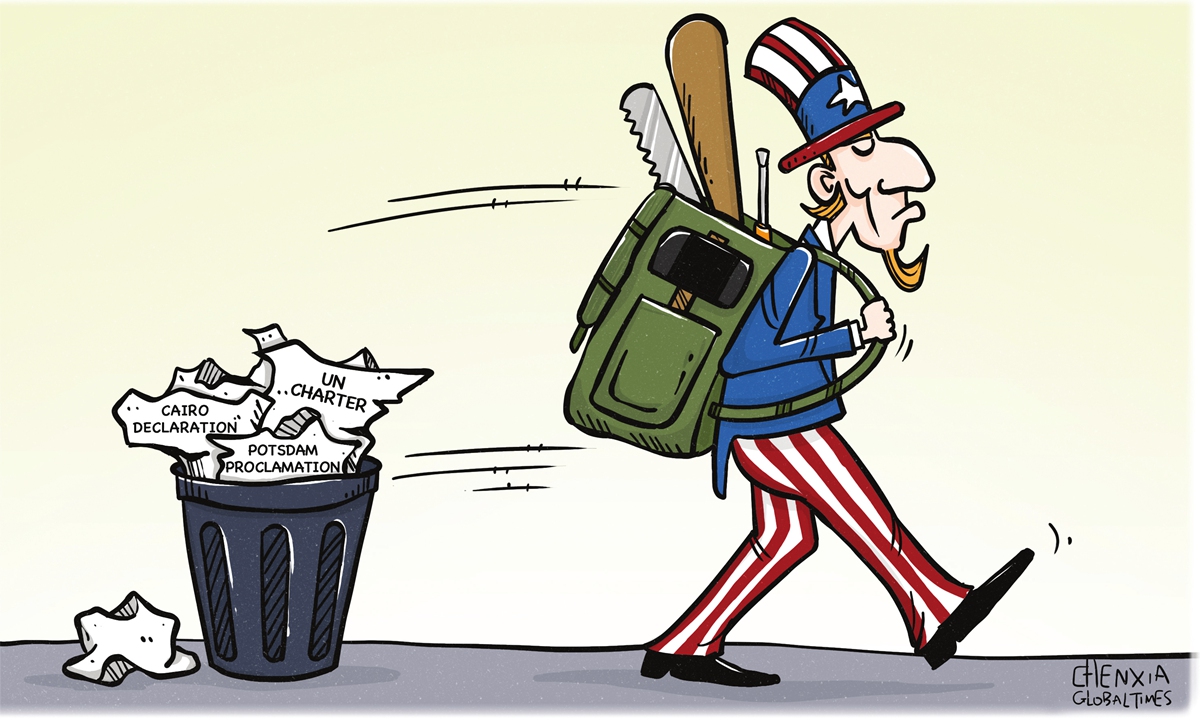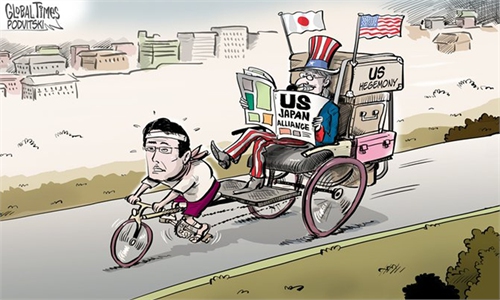US' so-called rules and international order a hypocritical claim to escape guilt

Illustration: Chen Xia/Global Times
There is intense competition between China and the US across various fields, including economy, trade, technology, diplomacy and military. On issues regarding sovereignty and territory that China cares about the most, especially the Taiwan question which concerns the core national interest, as well as the well-being of future generations of the Chinese people, we must do our utmost to safeguard it and not allow external forces to interfere with.
The recent visit of US House Speaker Nancy Pelosi to the island of Taiwan is a serious violation of China's sovereignty. As a result, China's military exercises and training activities in the Taiwan Straits in response to Pelosi's evil deeds is reasonable and legitimate. Yet the Americans allege that China has overreacted and undermined the rules-based international order, which is quite surprising. The sovereignty of China was violated by the US and China had to take legitimate measures to defend itself, but in US claims, China became the destroyer of the "rules and international order," how ironic.
The US needs to be reminded that China seriously abide by and uphold the existing rules of the world, such as the Cairo Declaration, the Potsdam Proclamation, the United Nations Charter, UN General Assembly Resolution 2758, the Three China-US Joint Communiqués, and the international order supported by the rules, which were signed and approved by the US. Is Washington today willing to abide by them? If not, it would be a destroyer of the rules and international order.
Since the US dares not publicly tear up and abandon these rules, it's necessary to further talk about them. The Cairo Declaration and the Potsdam Proclamation laid the foundation and framework for the establishment of the post-war international order, with the former explicitly declaring that "all the territories Japan has stolen from the Chinese, such as Manchuria, Formosa, and The Pescadores, shall be restored to the Republic of China;" and the latter highlighting that "Japanese sovereignty shall be limited to the islands of Honshu, Hokkaido, Kyushu, Shikoku and such minor islands as we determine." The two documents made clear that Taiwan is part of China, and China's territorial and sovereign integrity is inviolable, which is also under protection of the UN Charter.
UN General Assembly Resolution 2758 decides to "restore all its rights to the People's Republic of China and to recognize the representatives of its government as the only legitimate representatives of China to the United Nations, and to expel forthwith the representatives of Chiang Kai-shek from the place which they unlawfully occupy at the United Nations and in all the organizations related to it." In the China-US Shanghai Communiqué and the Joint Communiqué on the Establishment of Diplomatic Relations, the US explicitly recognized that "Taiwan is a part of China" and that "the Government of the People's Republic of China is the sole legal government of China." But is the US now going back on its words?
In the face of an increasingly powerful China and the voices of justice of the majority of the world, Washington dares not openly oppose to the rules, but has been secretly undermining them by strengthening the so-called "Taiwan Relations Act," "Six Assurances," and introducing "Taiwan Travel Act," "Taiwan Assurance Act" and "TAIPEI Act." What the US has done is hollow out the status of the Three Joint Communiqués, departing from the one-China principle and seriously eroding the political foundation of China-US relations. They are wrong signals to "Taiwan independence" separatist elements which directly endanger China's sovereignty.
What's more, the US is covering up its mistake with more mistakes, which is shameless. For instance, Washington used previous visits of other US legislators, including then-House speaker Newt Gingrich 25 years ago, to the island of Taiwan as a precedent and excuse for Pelosi's illicit visit to the island, in order to accuse that China was emotional and irrational.
According to the Joint Communiqué on the Establishment of Diplomatic Relations, people of the US will "maintain cultural, commercial and other unofficial relations with the people of Taiwan," which makes Gingrich's visit to the island a violation of the Communiqué.
Back then, the US, confident of its power, didn't admitted its mistake and didn't apologize to China. In an era of open information and national awakening, as the Democratic Progressive Party authorities go further on the path of "Taiwan independence," the Chinese government and its people will never sit idly by.
The US must not go back on its words, and not even make pretext for its wrongdoings to gain good reputation. There's no use to deceive the Chinese people with cunning tricks or bully them who are not to be messed with.
The author is Director of Taiwan Research Institute, Nanjing University. opinion@globaltimes.com.cn

